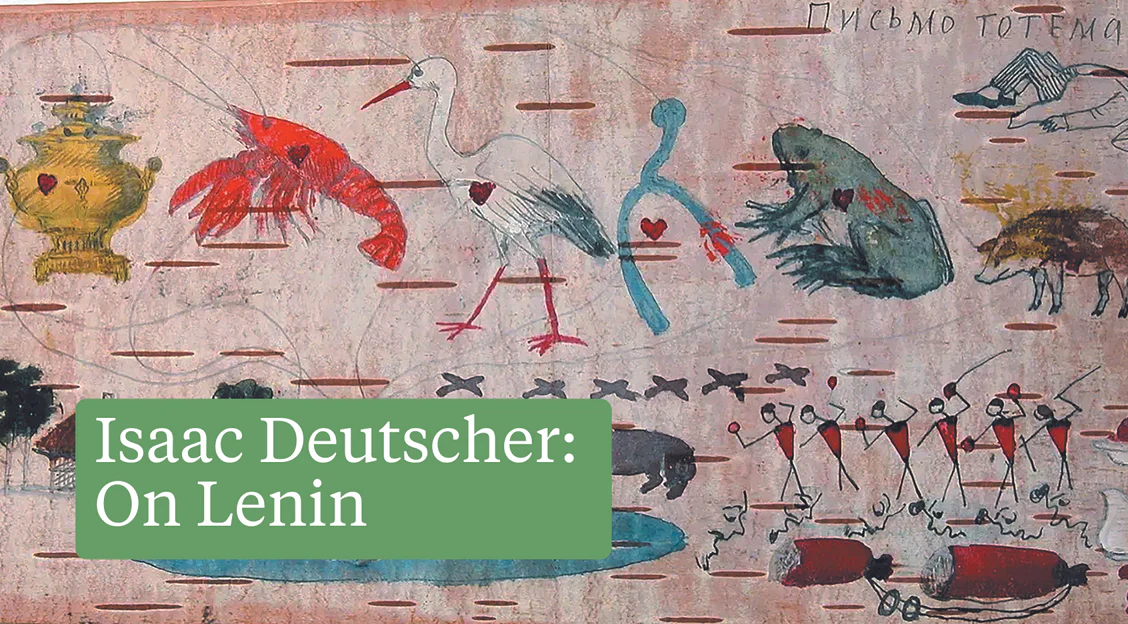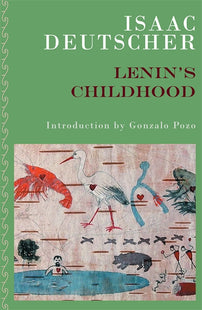Lenin looks back in anger
In this excerpt from Lenin’s Childhood, Isaac Deutscher creates a scene from the Twentieth CPSU Congress, 1956, where an imagined Lenin reflects on what Leninism has become.

It is the third day of the Congress, 8 p.m. Anastas Mikoyan is addressing the Soviet delegates, who listen with bated breath as he becomes the first to talk disparagingly about the dictator Stalin, the first to cast him as the ‘evil genius of the Soviet Union’. Part of the audience receives this as ‘a moment of extraordinary mental release’, but the rest are completely stupefied, ‘as primitive tribesmen might be when they witness unexpectedly the profanation of a tribal taboo— for it consists of tribesmen (sufficiently sophisticated to be ashamed of superstition)’.
Mikoyan, speaking under a statue of Lenin, turns his speech to his memory: ‘[T]he Leninist spirit and Lenin has permeated all our work and decisions, as if Lenin were still alive and here with us! How he would rejoice if he could see us now . . .’ Mikoyan wraps it up and moves back to his seat, amid stormy applause, when almost imperceptibly another man, ‘very small, with a large bald head, and short but shaggy beard’, his thumbs oddly stuck in his waistcoat, takes the rostrum. Nobody notices him at first, no applause greets him; but soon the audience realizes something familiar about him, and eventually notices the striking resemblance between the man and the statue. He begins to talk to them in a voice they have heard a hundred times before on records:
***
Comrades, I don’t very well know how to address you after all these years. I have heard Mikoyan say how very much at home I should have felt among you and how much I would rejoice to see that you are so faithful to my ideas [. . .] How I wish I could confirm to you wholeheartedly what Mikoyan has told you! How I wish I could I tell you that I rejoice in your devotion to what you have chosen to call Leninism! That I truly recognize you in my party, the party I once founded and inspired, and with my comrades’ consent led over many years. No, no, no! I would mislead you and cheat you if I told you that [. . .]
I have listened to so many speakers here extolling my memory—not one of you has referred to me without describing me as the Great Lenin. What a silly habit this is! How could you, my disciples, succumb, be it even for a moment to so benighted a habit of thought? Have I not sweated enough to teach you to look at the world, and at yourselves, as Marxists? To see the objective laws of development, the relationships of classes and nations and groups within the classes, and to treat leaders as the exponents of class interests and of varied mentalities and ideologies in which the nakedness of class interests is encased, as in so many cocoons? If there was ever any greatness, was it not merely the reflected greatness of our class and of our cause? Have you, for the sake of reflex, forgotten the living reality it reflected, or have you done something far worse? Have you inflicted on me that humiliation and insult of which I had my moments of faint premonition? Have you made me a holy icon? Have you made of me your harmless and ridiculouspatron-saint, to whom you burn stinking candles and of whose life you tell incredible tales to credulous children [. . .]?
If you have inflicted this insult on me then I declare myself your implacable enemy, and I swear that I shall summon all my might against you! Or do you delude yourselves that I am helpless? You still disseminate my ideas if only because you are the prisoners of your hypocrisy. You cannot use me as your patron saint without publishing and republishing my collected writings, which cannot but set agog the minds of your children, throw them into the most dangerous revolutionary unrest and turn them fully against their hypocritical fathers! Ha-ha-ha!
If you have your patron saint, you will be startled to discover that your patron saint is the chief seducer of your children! If you have turned me into a holy icon, then remember that I am a dynamite-laden icon, capable of bursting over your Pharisaical heads [. . .] Tell me the truth, have you made me the object of a sacred ritual? Tell me the truth! [. . .] I must unfortunately take your silence for an answer. How guilt has congealed your faces and your lips! I have yet to see such faces in my party! Or have I perhaps come here by mistake? Are you really the children of the Bolsheviks? I have listened to the man who gave you the report of the mandate commission. He said that among 1,600 delegates to your congress there were twenty-two that had joined our party before the October revolution. Twenty-two! Not more? And what has happened to the rest? Wait, it is now thirty- eight years since we made the revolution. Most of our comrades were very young people. Most joined the party in their teens. Young workers, apprentices and undergraduates from the school bench. The philistines would mock us as the party of immature revolutionaries, of children, but we were proud to be the party of youth, to lead those who were only at the threshold of life and therefore expected from life more than their elders did. Twenty-two! Where are the rest? Have gods loved them all so much as to make them all die so young? [. . .]
Is this the Bolshevik Party, I ask you? The party which in my days was divided in opinion even when it united for action—and how it united! The party which perpetually seethed with a ferment of ideas! Will you never heckle your leaders from the floor? Will you never contradict them? Will your rank and file never teach their leaders those severe lessons which our rank and file once taught us? Are you perhaps quite a new species of Bolsheviks, and are those twenty-two old members present here merely the last, amnesia-stricken Mohicans of a destroyed tribe? Open your mouth at last, for the Revolution’s sake! Speak! Speak! Speak!
— An edited excerpt from Lenin's Childhood by Isaac Deutscher. Introduction by Tamara Deutscher and Gonzalo Pozo.
[book-strip index="1" style="buy"]
